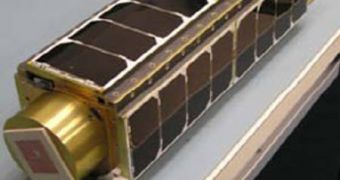Microbiologists are about to have one of their dreams come true on May 5th, as NASA has decided to launch into orbit a new nanosatellite, dubbed PharmaSat, which will hopefully offer experts new insight into how gravity and speed affect the growth of fungal cultures and that of yeast. The Minotaur 1 launch vehicle, which is partially derived from the Minuteman intercontinental ballistic missile range, will accommodate the new, 10-pound satellite as a secondary payload. The mission will blast off from NASA's Wallops Flight Facility and the Mid-Atlantic Regional Spaceport, in Wallops Island, Virginia.
The nanosatellite, no larger than a loaf of bread, will orbit the planet at a speed of about 17,000 miles per hour, and is designed to carry an instrument-packed micro-laboratory inside, in which various bacteria and fungal cultures will grow. A number of cameras and other types of high-tech sensors will particularly analyze the evolution of each individual organism, and the data will be relaid back to Earth in real-time, where experts will analyze it and, maybe, draw helpful conclusions for the treatment of a number of medical conditions.
“Secondary payload nanosatellites expand the number of opportunities available to conduct research in microgravity by providing an alternative to the International Space Station or space shuttle conducted investigations. The PharmaSat spacecraft builds upon the GeneSat-1 legacy with enhanced monitoring and measurement capabilities, which will enable more extensive scientific investigation,” NASA's Ames Research Center PharmaSat Project Manager Elwood Agasid, from the Center's headquarters, in Moffett Field, California, explains in a press release.
The nanosatellite will be inserted in a low Earth orbit, and will fly at about 285 miles above the surface of the planet. It will transmit its data to two listening posts – the SRI International, in Menlo Park, California, and the Santa Clara University, in Santa Clara, California.
“PharmaSat is an important experiment that will yield new information about the susceptibility of microbes to antibiotics in the space environment. It also will prove that biological experiments can be conducted on sophisticated autonomous nanosatellites,” University of Texas Medical Branch Department of Pathology and Microbiology and Immunology PharmaSat's co-investigator David Niesel, from the Galveston-based university, adds.

 14 DAY TRIAL //
14 DAY TRIAL //